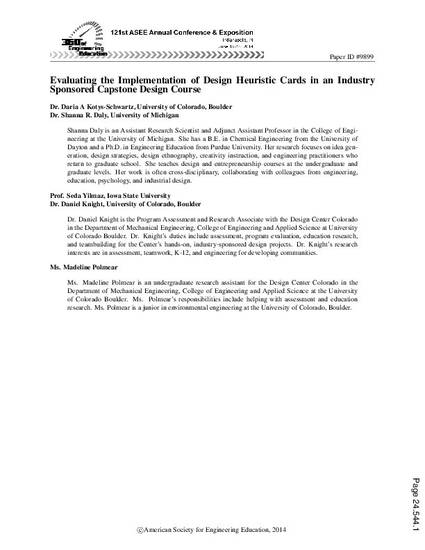
Article
Evaluating the Implementation of Design Heuristic Cards in an Industry Sponsored Capstone Design Course
2014 ASEE Annual Conference
Document Type
Conference Proceeding
Disciplines
Publication Version
Published Version
Publication Date
6-15-2014
Conference Title
2014 ASEE Annual Conference
Conference Date
June 15-18, 2014
Geolocation
(39.768403, -86.15806800000001)
Abstract
Using Design Heuristics to Develop Concept Generation Skills in an Industry Sponsored Capstone Design Course Concept generation is a key skill for success in capstone design courses. Yet, this skill is rarely emphasized in traditional design courses. The present study investigates the introduction of Design Heuristics to facilitate expanded concept generation in an applied setting, a capstone design course in mechanical engineering charged with developing real-world projects for paying industry clients.Design Heuristics are cognitive prompts that enable exploration of the design space during concept generation. There are 77 Design Heuristics strategies, validated by research, and represented on a separate card in a deck. Each card includes a description of the heuristic, an abstract image depicting the application of the heuristic, and two product sketches showing how the heuristic is evident in existing consumer products. In this study, we explored design teams’ use of the Design Heuristics as well as the success of teams during concept generation as a whole.Participants in the study were 120 upper division students enrolled in a year-long, team-based,industry-sponsored capstone design course in mechanical engineering. Students developed projects for industry clients with support from faculty Project Directors. Students were trained on applying the Design Heuristic cards during class. Feedback on the Design Heuristics cards was collected and concept generation progress was assessed via pre, mid, and post surveys of students, Industry Clients, and Faculty Directors.Considering the success of concept generation as a whole, results from triangulated ratings indicated that clients, faculty, and students expressed satisfaction for the concept generation phase of the project at the end of the year with regards to the quantity (combined mean = 3.91/5),creativity (combined mean = 3.90/5), and diversity of ideas (combined mean = 3.93/5) generated within the teams. One faculty director commented, “It would be difficult to improve their final product. They had an incredible array of ideas and were able to implement most of them.” With regards to Design Heuristics, one student commented, “Design Heuristics was a really interesting facet of the project. This was really fun and if it could be expanded that would be helpful,however, with limited time it seemed to be balanced well.”Suggestions for improvement in concept generation focused on generating an even wider range of ideas. One Faculty Director commented, “They seemed a little hesitant to throw out ideas or they would rally behind a single idea versus a brainstorm. They seemed like they wanted an answer versus a list of options.” One industry client wished the team would have, “come up with at least 5 ideas that the company mentor and customer had not thought of.” Similarly, one student team member suggested the team should have, “thought outside of the box more,considered wilder ideas prior to latching on to a design path.” Further tips for thinking outside the box included more research, less defensiveness around personal preferences for ideas, and more time using Design Heuristics. Additional results and conclusions will be discussed in the paper.
Rights
© 2014 American Society for Engineering Education. Other scholars may excerpt or quote from these materials with the same citation. When excerpting or quoting from Conference Proceedings, authors should, in addition to noting the ASEE copyright, list all the original authors and their institutions and name the host city of the conference.
Copyright Owner
American Society for Engineering Education
Copyright Date
2014
Language
en
File Format
application/pdf
Citation Information
Daria A. Kotys-Schwartz, Shanna R. Daly, Seda Yilmaz, Daniel Knight, et al.. "Evaluating the Implementation of Design Heuristic Cards in an Industry Sponsored Capstone Design Course" Indianapolis2014 ASEE Annual Conference (2014) Available at: http://works.bepress.com/seda-yilmaz/8/

This is a proceedings from 2014 ASEE Annual Conference, June 15-18, 2014. Posted with permission.